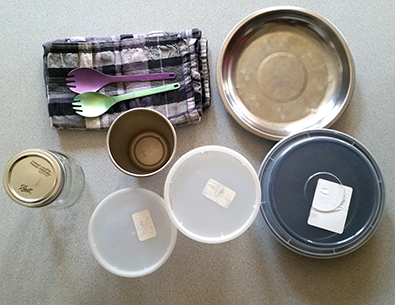One important step to implementing a low-waste lifestyle is reducing the amount of disposable items you use. By cutting back or eliminating single-use items, you can save the energy and materials that went into them AND prevent waste. It’s important to keep in mind that reusable items take energy and resources to produce as well, so the general rule with reusable is to use them repeatedly and consistently to offset their environmental impact.
Not sure where to start? Here are 10 disposable items to stop using right now!
- Paper and plastic drink cups: Paper coffee cups have a plastic coating that makes them unacceptable for recycling and composting, meaning they have to go in the trash. And although plastic cups are recyclable, the plastic cannot be recycled indefinitely and eventually becomes trash. Remember to bring a reusable coffee mug or cup when you get takeout (some places even give you a discount!), or take some extra time and sit down at a café that uses reusable cups. Also, get in the habit of carrying a reusable water bottle with you everywhere you go.
- Plastic grocery bags and produce bags: Plastic grocery and produce bags cause problems at facilities that sort your recycling, so they should never be put in your recycling cart at home. They can be brought to retailers or other drop-off locations for recycling. Instead of throwaway bags, keep a few reusable bags near the door or in your car to ensure you always have them when you go shopping. Remember to not only use reusable bags at checkout; you can use your own reusable bags for produce, too. Additionally, don’t limit your reusable bag use to the grocery store – remember reusable bags when you go shopping for clothing, shoes, gifts and everything!
- Paper towels: Trade in paper towels for an old-fashioned cloth rag or sponge. These are more durable, and you can wash them rather than throwing them out.
- Plastic utensils: Start by bringing reusable utensils for your lunch so you can avoid taking plastic utensils from dispensers. Then, start refusing them when they are offered. It’s easy to find a few inexpensive pieces at a thrift store if you don’t want to risk losing pieces of your regular set.
- Single-use coffee pods: Single-serve coffee makers such as Keurigs create a lot of waste with no recycling option. You can pull apart the cup and compost the coffee grounds, but no recyclers accept the plastic cup or foil lid. If you already have a machine, try reusable pods, which are now widely available in stores and online.
- Napkins: Napkins may seem harmless, but they add up! Think about all those times you have received napkins and never even used them. Start by using a cloth napkin at home or for lunches at work. You can easily toss them into your laundry without having to do an extra load. Once you’re used to that, think about carrying one with you so you’re ready for any situation!
- Straws: Straws aren’t recyclable, and they last forever! Cut back your use or eliminate straws by simply choosing to go without (or make a reusable straw part of your zero waste kit). Want to do more? Start thinking ahead and mention to your waiter or barista that you would like your drink without a straw before they even prepare it.
- Plastic baggies: Plenty of alternatives for plastic zip bags exist. Use reusable containers in plastic, glass, or metal, or choose reusable snack bags.
- Liquid soap dispensers: The pump for soap dispensers and related products are not recyclable. Choose to buy your soap in bulk and refill your existing container instead.
- Cleaning wipes: An easy way to cut back on disposable cleaning wipes like disinfecting wipes, mop cloths and dusters is to choose an alternative when they run out. A green cleaner and reusable cloth will work in place of disposables for any of these applications.
As you tackle this list, remember that it may take a while to change your habits. Whether you choose one or all of these disposables to avoid, start small and keep working. Soon you will have developed a habit that results in a lot less waste and a healthier planet!

